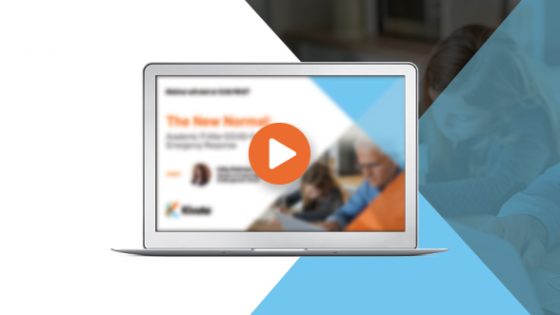COVID-19 has redefined the status quo and changed every aspect of our lives this year. Education is no exception.
Colleges and universities had to transition to distance learning overnight. Remote education has become the new norm. This has created unprecedented new challenges for students, educators, and academic institutions. However, it’s also created opportunities to modernize and improve how education is delivered in the future.
Challenges
We know that academic IT costs have skyrocketed since the start of the pandemic. And these monetary costs are just the most obvious and easily measurable challenges that academic institutions have faced in these trying times.
The move to remote education has been overwhelming for all involved. IT teams work seemingly 24/7 to ensure continuous access for users. Educators need to learn new tools and move their curricula online. Students struggle to engage with content over a screen. Zoom fatigue – an increasingly common condition in our socially distanced world – can have a detrimental impact on morale and the learning process.
The pandemic has also highlighted and exacerbated equity issues in education. This is one major disadvantage to remote learning that institutions are still struggling to address. In an environment where courses and course resources are accessed exclusively online, a student’s economic status directly impacts the quality of their education, as not all students can afford high-speed internet, unlimited bandwidth, and top-of-the-line personal devices.
Opportunities
For all the challenges described above, the pandemic has also produced a huge opportunity. It’s given institutions a chance – and incentive – to reinvent education and address the “old challenges” of the industry.
As the world becomes more digital, educators should rethink their curricula and decide whether it makes sense to simply digitize lessons or redesign courses from the ground up for online delivery. Schools should embrace new tools and technologies to streamline the delivery of online lessons. The focus should shift from replicating face-to-face education to enhancing and optimizing the online learning experience.
Changes initially intended as stopgaps to weather COVID-19 can become core components of a new and improved model of education. When the pandemic has passed, most institutions will likely settle on a hybrid approach mixing in-person and remote learning. The changes institutions make now should aim to enable that future and leverage technology to enrich both experiences.
Lessons
In an earlier blog post, we examined some of the lessons colleges and universities can learn from COVID-19. Now let’s look at a couple more.
The first is that traditional long lectures aren’t ideal in a distance-learning environment. Discussions and interactive activities have a much better chance of engaging students. As educators are forced to revisit lesson plans, we have an opening to move to student-centered, project-based, and hands-on learning.
Another thing COVID-19 has taught us is the importance of looking at our colleagues, students, and professors on a human level. Remembering to have compassion for the professor struggling with new technology or the student unable to afford such technology. A human-centered approach to education is key to fostering mental health and producing more compassionate people. Society as a whole can benefit from this lesson.
The future of education is bright. If institutions learn from the current crisis and take advantage of the opportunities it’s presented, the industry may come out on the other side stronger than ever.
The New Normal
Find out how academic IT teams are navigating the challenges of the post-COVID era. Check out our webinar “The New Normal: Academic IT After COVID-19 Emergency Response.”














No Comments